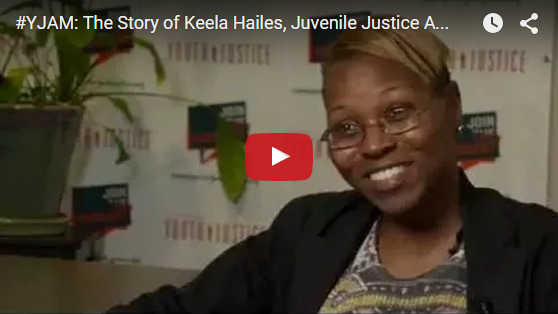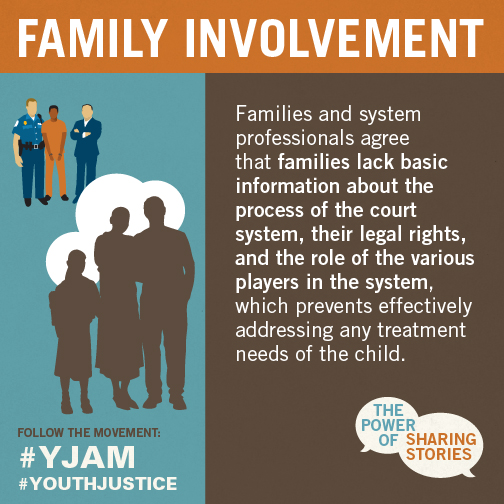
My name is Keela Hailes and I am a mother and juvenile justice advocate and I am sharing my story during Youth Justice Awareness Month in hopes that it will help other families.
A few years ago, while living in Washington, D.C., my son was incarcerated hundreds and hundreds of miles away from me and the rest of his loved ones. Every day in Washington, D.C., parents are being separated from their children because they are being sent to adult prisons in other states. All too often, these adult prisons are very far from home. Because Washington D.C. is not a state, and does not have a Federal facility, our children are sent to remote and often times inaccessible Federal adult prisons all across America. As a woman who has always prided herself for being a stickler for self-accountability, I'm not suggesting that my son should've gotten away with a slap on the wrists. However, research has shown that placing children in adult prison's, rather than juvenile facilities makes them highly susceptible to repeat criminal behavior, negative influence from adult prisoners, and physical and sexual abuse.
Typically, I don't go around discussing brain development, but it goes to the heart of an issue that's near and dear to me, as well as thousands of other parents, across the country. Brain science is crucial in understanding how teenagers make decisions and act upon them. The Myelin Sheath is essential to brain development; it covers nerve cells that allow impulses to travel fast and efficiently. It’s not fully developed until the age of twenty-five with the frontal lobe being the last area of the brain to be myelinated. The frontal lobe houses the area of the brain where we process higher brain functioning like reasoning, problem solving, planning and executing behavior, and impulse control.
Because we know this about the brain, society is very careful about the things that we allow kids to do before the age of 18. For example, youth cannot buy cigarettes or alcohol. They cannot get a driver’s license or even vote for the President of the United States. These decisions take a higher level of reasoning and analytical skills that have not been properly developed in the teenage brain. If we know this is true, then why does it seem rational to treat kids with adult sanctions when they engage in unlawful behavior?
I think about these things because one day I received a call that my sixteen-year-old son was arrested for armed robbery. I sat stunned on the other end of the phone and wondered if the caller had the right number or right mom for that matter. After the initial shock, thousands of questions flooded my mind, “Why in the world would he do something this stupid?” “What was he thinking?” or “Was he thinking at all?” I was an involved parent who monitored my son’s friendships and education, what was going on?
After the details of the robbery were laid out on the table, I was no longer in denial about my son’s involvement. I wanted him to not only be held accountable but soundly rehabilitated. I knew nothing about the juvenile justice system and had assumptions about what a juvenile judge would offer as next steps, which in my mind would include programs, counseling and therapy.
My world was rocked again when I learned that my son would be charged as an adult and sent to the DC jail. Again, those same questions permeated my mind, “Why in the world would the government do something so stupid as to send a child to spend even one second in a jail?” “What in the world are they thinking?”, or “Are they thinking at all?”
Unfortunately, my questions were never answered because my son was swiftly sent to the DC jail, even before having a hearing. He sat unproductively on the juvenile unit of the DC Jail waiting where he was physically assaulted by a Correctional Officer, received zero services, and was finally shipped 1,500 miles away to Devils Lake, North Dakota to serve out his 3 year sentence.
The negative effects of this experience are still felt today. In my eyes, my son went from a sixteen-year-old-child to a thirty-year-old-man overnight, absent the completed brain development. In his own eyes, he had no other choice but to go from a child to a man overnight to cope with his new surroundings. He served out his sentence, came home and tried to be a productive member of society; however, two years later, he reoffended and was sent back to jail.
I believe kids should be held accountable and am advocating for common sense measures that hold youth accountable and give them an opportunity to rehabilitate. Studies have shown us that this can, and should happen in the juvenile justice system.
Keela Hailes is a Program Manager for Free Minds Book Club & Writing Workshop and a spokesperson for the Campaign for Youth Justice, and is committed to ending the practice of trying, sentencing, and incarcerating youth under the age of 18, in the adult criminal justice system.
Below is some sample language that you can use to help spread awareness of National Youth Justice Awareness Month.
TWEETS
-
To help their children, families need information about juvenile rights and responsibilities. #YJAM
-
Children charged as adults, are still children who need the support of their families. #YJAM
-
Families lack basic information about the process of the courts, and their legal rights, and the role of various players in the system. #YJAM
-
Without family engagement, effectively addressing any treatment needs of the child is difficult. #YJAM
-
Many inmates say that their success upon re-entry to society can be attributed to their strong family connections. #YJAM
FACEBOOK
-
President Barack Obama has signed a proclamation declaring October 'National Youth Justice Awareness Month' and calls on Americans to "observe this month by getting involved in community efforts to support our youth, and by participating in appropriate ceremonies, activities, and programs." http://sparkaction.org/content/president-proclamation-yjam #YJAM #youthjustice #JJDPAmatters
- Children don’t grow up in systems, they grow up in families. Help youth incarcerated as adults by finding resources and joining advocacy groups for youth. #YJAM
